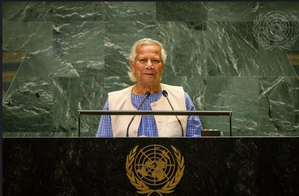United Nations: Bangladesh leader Muhammad Yunus said that his government will uphold its bilateral treaties and is open to friendly relations with all countries based on mutual respect.
Speaking in Bengali at the high-level session of the United Nations General Assembly on Friday, the de-facto Prime Minister, said, “I wish to assure that our government shall adhere to all international, regional and bilateral instruments that Bangladesh is party to.”
“Bangladesh is open to nurture friendly relations with all countries based on mutual respect, upholding our dignity and pride and shared interests,” he said.
The Nobel Prize-winner and microfinance pioneer holds the title of Chief Adviser of the interim government and functions as the de-facto Prime Minister.
Yunus, who was invited by President Mohammed Shahabuddin to head the interim government after Prime Minister Sheikh Hasina resigned from her position as a wave of protests swept Bangladesh, said the Armed Forces backed the “Monsoon Revolution” by “standing firmly with the people”.
“During the recent revolution, our valiant armed forces have once again shown their commitment to peace by standing firmly with the people in fulfilling their aspirations for freedom during a most difficult time in our history,” he added.
Yunus called the protests in July and August the “Monsoon Revolution” that “primarily brought together people who were long left (out) in politics and development”.
“The people aspired for a just, inclusive, and functioning democracy for which our new generations made supreme sacrifice,” he said.
“We believe, the “Monsoon Revolution” that the world witnessed in Bangladesh in the span of few weeks, may inspire many across communities and countries, to stand for freedom and justice,” he added.
He asserted that when he took over, “justice, ethics and morality, almost at every level, reached a low”.
Oligarchs took over businesses and corruption was endemic, he said.
“We are committed to promote and protect the fundamental rights — for people to speak in freedom, to assemble without fear or inhibition, to vote whosoever they choose, to uphold the independence of the judiciary and freedom of press, including in the cyber domain,” Yunus added.
But he did not mention freedom of religion given that the country has seen a paroxysm of violence against Hindus and other minorities.
–IANS


Comments are closed.